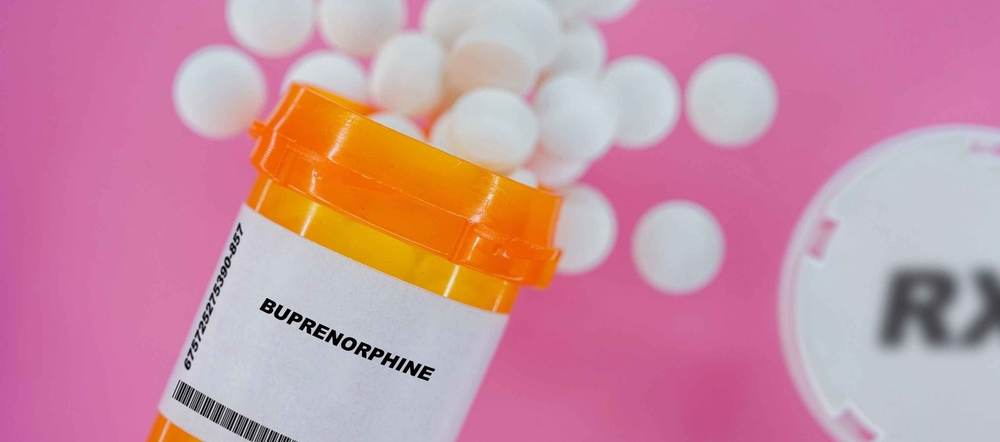Last Updated:
May 16th, 2025
Buprenorphine Addiction | Signs, Effects and Causes
Buprenorphine has been a lifeline for countless individuals struggling with opioid addiction. Ironically, however, while buprenorphine can help break the chains of addiction, it can sometimes bind its users to a new form of dependence. This creates a frustrating cycle which feels like one step forward and two steps back. Not everyone will develop a buprenorphine addiction, but understanding the potential and the warning signs and risks can help everyone use it safely and responsibly.

What is buprenorphine?
Buprenorphine is a medicine mainly used to help people who are in addiction recovery from opioids like heroin. It works by gently activating the brain’s opioid receptors which helps to lessen cravings and soften the withdrawal symptoms that come when someone stops using opioids. Brand names for buprenorphine include Suboxone, Buprenex and Subutex.
Buprenorphine doesn’t give the intense high and has a “ceiling effect, ” meaning its effects don’t get stronger beyond a certain dose. All of this lowers the chances of buprenorphine being abused and of somebody overdosing on the drug. However, buprenorphine is still possible in some cases, as well as other side effects of buprenorphine, including:
- Dizziness
- Tiredness
- Constipation
- Nausea and vomiting
- Headaches
- Sleep problems
- Sweating and shaking
In the UK, buprenorphine is a Class C drug under Schedule 3 of the Misuse of Drugs Regulations 2001. This classification comes with strict rules and heavy penalties for unauthorised use. Doctors can prescribe buprenorphine, but they must closely monitor their patients to ensure it is used safely and legally.
What is buprenorphine addiction?
Buprenorphine addiction occurs when someone finds themselves unable to stop using buprenorphine even though it is becoming an obvious problem. Although buprenorphine’s ceiling effect greatly reduces the risk of recreational misuse, prolonged use of any opioid can still lead to dependence.
Physical dependence develops because the constant presence of buprenorphine in your system causes your body and brain to adapt to its regular availability. If you then attempt to reduce or discontinue buprenorphine, withdrawal symptoms hit which ironically are the very issue buprenorphine is prescribed to manage.
A psychological dependence on buprenorphine can also form, often fueled by the fear of returning to other opioids. This fear might lead you to increase your buprenorphine dosage, rationalising it as a preventative measure against more harmful substances. Unfortunately, this mindset can lead to a daily dependency that may seem like the lesser of two evils but still results in addiction.
The warning signs of buprenorphine addiction
Spotting buprenorphine addiction symptoms can be tricky, especially because it usually begins with a legitimate prescription. However, being aware of the subtle shifts in behaviour and health can help identify a buprenorphine addiction early. Keep an eye out for these telltale buprenorphine addiction signs and symptoms:
- You feel awful if you stop using buprenorphine because of withdrawal.
- You don’t want to stop buprenorphine because you are worried about relapsing with heroin or another drug.
- All of your time and money is spent on buprenorphine.
- You’re putting off responsibilities to use buprenorphine.
- Buprenorphine is starting to mess up your friendships and family life.
- You lie about how much buprenorphine you take.
- You don’t want to hear anybody’s concerns about your buprenorphine use.
Do you recognise these buprenorphine addiction symptoms? Don’t panic – use them as a wake-up call and seek professional help for buprenorphine addiction.
What causes buprenorphine addiction?
Buprenorphine addiction can happen for several reasons, including what’s going on in a person’s life, their environment and even their genetics. Here is why some people might find themselves getting too reliant on buprenorphine:
A brain wired for addiction
Most people start taking buprenorphine as part of their addiction recovery plan. However, previous addiction issues may indicate your brain is more susceptible than others to addiction.
Difficult life situations
If you are under a lot of stress or have been through some really hard times, you might start using buprenorphine to cope with the hardships. It can then start to feel like you can’t face life without buprenorphine, even though it starts causing new problems.
Mental health struggles
When dealing with tough feelings like anxiety, depression or PTSD, you might think taking buprenorphine can help. But using buprenorphine on your own without a doctor’s supervision creates a huge risk of addiction.
Feeling alone
Trying to overcome addiction can feel a lot tougher without friends, family or other supportive people around. When you feel alone, it might seem easier to misuse buprenorphine and become addicted to it.
Misunderstanding the potential dangers
It is easy to believe that buprenorphine is totally safe because it is legally available. However, this can make you complacent, increasing the risk of misuse and a resulting buprenorphine addiction.

The mental and physical dangers of Buprenorphine addiction
Buprenorphine addiction can have a devastating impact on your physical health and also do an enormous deal of mental harm. Here are some of the most concerning dangers:
Buprenorphine overdose
Buprenorphine’s ceiling effect reduces its potential for harm but overdose is still possible, especially if it is mixed with things like alcohol or benzodiazepines. A buprenorphine overdose can make it hard for you to breathe, knock you unconscious, and, in the worst cases, can be deadly. This is why following your doctor’s instructions and being careful with other substances is so important.
Physical health dangers
There are extensive physical health dangers with buprenorphine addiction. Buprenorphine abuse can cause respiratory depression where your breathing becomes dangerously slow and shallow. This can deprive your brain of oxygen, leading to severe health problems or even death.
Long-term use of buprenorphine can also harm your organs, including your liver and kidneys. These organs play critical roles in filtering toxins and waste from your body, and damage to them can lead to serious health issues over time.
If buprenorphine is injected using shared or unclean needles, there can also be a big risk of spreading HIV and hepatitis.
Mental health dangers
Buprenorphine addiction can make any existing mental health problems even tougher to handle, intensifying mood disorders, deepening depression and increasing anxiety. It can also create new mental health issues which can make it even harder to manage and recover from addiction.
How to overcome buprenorphine addiction
Treatment for buprenorphine addiction starts with detox which you have probably been through before if you have previously been through recovery. This is where doctors help you gradually lower your use of buprenorphine, which prevents a shock to your system and minimises withdrawal symptoms. Sometimes, they might use another medication to ease the transition, making the buprenorphine detox process more comfortable.
You will then need to work through the thoughts, feelings and experiences that have made you emotionally and mentally reliant on buprenorphine. This is done through opioid rehab, and it is a very important step for addressing what may have gone wrong in previous recovery attempts and helping you move forward more confidently.
There are plenty of treatment options in the UK, from private rehab centres and free NHS services. Taking the time to look into what’s available means you can find the right fit for you and set yourself up for the best chance at recovery.
How to get help for buprenorphine addiction
If you’re struggling with Buprenorphine addiction, reaching out can be the first step toward turning things around. No two journeys are the same, so we’ll help you explore options that fit your needs, whether it’s a specific type of therapy, a certain location, or a programme that feels like the right match. Contact us today, and we will guide you toward a path of renewed hope and a healthier future.
Our compassionate team are ready and available to take your call, and guide you towards lasting the lasting addiction recovery you deserve.

